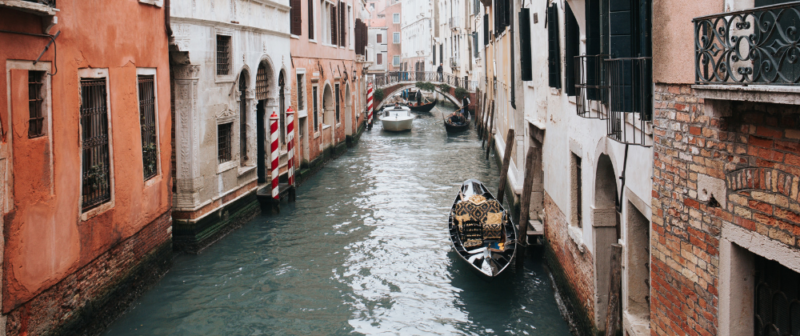Venice
5 things NOT to do in Venice: a few tips for tourists
Visit St Mark’s Square. Take a gondola ride. Buy a carnival mask. We all know the staples of what to do when we’re in Venice – but what about things […]

The canals of Venice are among the world’s most romantic places, but before the atmospheric waterways we know and love today came into existence – before the grandeur of the city’s opulent palazzos and piazzas – there was only a marshy, muddy lagoon with little going for it beyond a smattering of 124 small islands. So how was this miraculous ‘floating city’ created from such humble origins? And just how deep are Venice’s canals? Keep reading to find out!
The city of Venice, located in northeastern Italy, is known worldwide for its unique and intricate system of canals that winds through the city’s narrow streets and squares. However, what many people don’t realize is that this network of waterways was not a natural feature but rather a remarkable feat of human engineering.
The system of canals in Venice is among the most famous and iconic in the world. To make the islands of the Venetian lagoon fit for habitation, Venice’s early settlers needed to drain areas of the lagoon, dig canals and shore up the banks to prepare them for building on.
They began by digging canals and lining them by driving closely spaced wooden stakes – many of them made from water-resistant alder wood – through the sand and mud to rest on the harder clay beneath. On top of these stakes, they placed wooden platforms and then stone, and this is what the buildings of Venice are built on.
Over time, the city grew and expanded, with more canals being dug and more buildings constructed on top of these remarkable wooden foundations. Of course, with no forest in the lagoon, this wood had to be imported by boat on a vast scale from forested areas that now form parts of modern Montenegro, Slovenia and Croatia. It may seem surprising that the wood on which Venice is built has withstood the test of time, but this is because it’s submerged in oxygen-poor water that doesn’t create the conditions needed for microorganisms to flourish and decay the wood. Not only that, but because it’s saltwater, salt and other minerals have, over time, seeped into the wood and hardened it to an almost stone-like state.
Today, the canals of Venice remain a testament to the ingenuity and resourcefulness of the city’s early settlers. Despite centuries of wear and tear, they continue to serve as a vital transportation network and a source of beauty and inspiration for visitors from around the world.

How was Venice built? It is necessary to go deeper into the topic. Why was Venice built on water? The correct answer is that this choice was supported by several reasons.
Firstly, the city’s lagoon provided a natural defensive barrier against invaders, which was crucial during the turbulent Middle Ages. The shallow waters and numerous islands made it difficult for enemy ships to navigate, giving the Venetians a strategic advantage.
Secondly, the lagoon provided an abundant supply of fish and shellfish, which were a key source of food for the city’s inhabitants. The waterways also served as a vital transportation network, allowing goods to be brought into the city from the surrounding countryside and facilitating trade with other parts of Europe and the Mediterranean.
Finally, the city’s location on the water allowed for efficient waste disposal. Venice’s early residents built a sophisticated system of canals and sewage pipes that carried waste out of the city and into the lagoon, helping to prevent the spread of disease and improve public health.
Overall, the unique combination of defensive advantages, economic opportunities, and environmental factors made Venice an ideal location for settlement, and the city’s remarkable engineering feats allowed it to thrive and grow into one of the most beautiful and iconic cities in the world.
The depth of the canals in Venice varies depending on the location and the size of the canal.
There’s no single answer to this, because the depth varies greatly, and also depends on factors such as dredging work and the level of the tide. In general, the canals in Venice are relatively shallow, with an average depth of around 1.5 to 2 meters. The Grand Canal – the big canal that runs through the heart of Venice – is deeper, at an average of 5 metres, while the Canale della Giudecca – which separates the main part of Venice from the island of Giudecca – is around 12 to 17 metres deep.
| Canals | Depth |
| Most of the canals | 1.5 – 2 meters |
| Canal Grande | 5 meters |
| Canale Della Giudecca | 12 to 17 meters |

If you are wondering how deep the water is in Venice, it’s important to note that the level is affected by the tides. The water level can rise and fall by up to 1 metre or more in some areas.
During periods of high tide, known as “acqua alta“, water levels can flood the streets and squares of Venice, creating challenging conditions for residents and visitors alike. What does Venice look like under the water? On days when everything is submerged, it seems easier to imagine it.
The city has implemented a sophisticated system of barriers and pumps to mitigate the effects of high tides, but rising sea levels and climate change continue to threaten the city’s future.
Maintaining the canals of Venice is an ongoing task that requires a significant amount of effort and resources. Several methods are used to keep the canals in good condition. The canals are regularly cleaned using a combination of mechanical dredging and manual removal of debris.
This helps to keep the waterways clear and free of obstructions, which is important for both navigation and preventing flooding. Over time, the walls of the canals can become damaged or weakened by erosion, wave action, and other factors. To prevent collapse or further damage, the walls are periodically repaired and reinforced using materials such as concrete and steel.
Boat traffic can contribute to erosion and damage to the canal walls, so it’s important to control the speed and frequency of boats passing through the canals. The city enforces speed limits and regulates the number and size of boats that are allowed to navigate the canals.
Want to find out more about how Venice works? Then look at this fascinating video to see how the canals are built and maintained, and get an insight into the work that goes into keeping this incredible city ‘afloat’.
Venice Backstage. How does Venice work? from Insula spa on Vimeo.
Venice
Visit St Mark’s Square. Take a gondola ride. Buy a carnival mask. We all know the staples of what to do when we’re in Venice – but what about things […]
Venice
Is Venice sinking? Discover the fate of this enchanting city’s waterways and future risks Acqua alta Many people wonder if Venice is sinking. If you’re familiar with Venice you’ll probably […]
Venice
If you’ve never heard of Mestre before, it’s hardly surprising. This unprepossessing town on the Italian mainland isn’t exactly well-known in comparison with the celebrated Venetian islands of the neighbouring […]